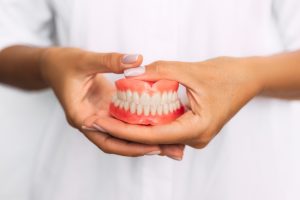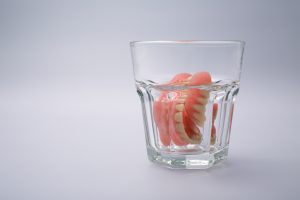

Do You Know How Denture Adhesive Works?
Imagine biting into a juicy apple or laughing heartily without the fear of your dentures slipping out! That’s the confidence that a high-quality denture adhesive can give you. As simple as they may seem, picking the right denture adhesive can be a game-changer in your oral care routine and dramatically enhance your quality of life.
Our dentists in Staten Island have created the ultimate denture adhesive guide, where they go over various types of adhesives, their benefits, and more.
What Are Denture Adhesives?
Denture adhesives are non-toxic, removable substances used to enhance the retention, stability, and performance of dentures (prosthetic devices constructed to replace missing teeth). They’re particularly useful for those who wear complete or partial removable dentures.
Types of Denture Adhesives
When it comes to denture adhesives, there are various types available in the market to suit individual preferences and needs:
- Denture Adhesive Cream and Pastes: This type of denture adhesive is typically in gel or cream form, providing a stronghold for dentures, and preventing movement or slippage while talking or eating. Adhesive pastes create a seal between the denture and gums, promoting stability. They’re easy to apply with a nozzle and tend to have longer-lasting effects compared to other options.
- Denture Adhesive Powders: Denture adhesive powders are a popular alternative that provides excellent grip and stability. These powders are sprinkled onto the surface of wet dentures before placement in the mouth. As saliva mixes with the powder, it forms a secure bond between the denture and gums.
- Denture Adhesive Strips and Thin Films: These convenient options come in pre-cut strips or thin film forms that adhere directly to the inner surface of the dentures. The moisture from saliva activates the adhesive properties, ensuring your dentures stay firmly in place throughout the day. Using adhesive strips is like applying double-sided tape; their discreet nature allows you to confidently engage in conversations without worrying about your dentures becoming loose mid-sentence.
Clinical Strength vs. Natural Options
Clinical strength denture adhesives are specifically formulated with a strong bonding power to provide optimal grip and hold for dentures throughout the day. These adhesives often contain higher concentrations of adhesive properties such as zinc and other binding agents. The increased strength ensures that the dentures stay securely in place, even during activities like eating, talking, or laughing vigorously.
Natural denture adhesive options focus on providing a secure hold without the use of additional chemical ingredients. These adhesives typically contain plant-based ingredients like seaweed extracts or gum Arabic, which create a natural adhesive bond between the gums and dentures. Natural denture adhesive cream options are sought after by those who prefer to minimize exposure to potentially harsh chemicals found in clinical-strength adhesives.
Benefits and Drawbacks of Denture Adhesives
Benefits of denture adhesives include:
- Improved Stability: Denture adhesives provide enhanced stability and prevent dentures from shifting or slipping. This improved stability can boost confidence and allow wearers to enjoy their favorite foods and activities without worry.
- Enhanced Comfort: Adhesives can help alleviate discomfort caused by ill-fitting dentures. By creating a secure bond between the gums and dentures, adhesives can minimize irritation and sore spots, resulting in a more comfortable denture-wearing experience.
- Improved Speech: Denture adhesives can improve speech by preventing dentures from moving while talking. This helps eliminate slurring or mumbling that may occur due to unstable dentures.
However, it’s important to consider a few potential drawbacks when using denture adhesives:
- Possible Allergic Reactions: While rare, some individuals may develop allergies or sensitivities to certain ingredients found in denture adhesives. It’s crucial to carefully read the ingredient list and discontinue use if any adverse reactions occur.
- Overuse Risks: Using excessive amounts of denture adhesive can lead to poor fit and cause discomfort or gum irritation. It’s essential to follow the recommended guidelines provided by the manufacturer or consult with a dental professional for proper application techniques.
- Dependency Concerns: Denture wearers should be cautious about developing a dependency on denture adhesives as a remedy for ill-fitting dentures. It’s advised to consult with a dental professional to address any underlying issues with the fit of the dentures.
Ingredients of Common Adhesives
Denture adhesives contain a combination of various ingredients that work together to provide grip and comfort for denture wearers. Understanding the key components of these adhesives is essential in making informed decisions about which product to choose.
Let’s break down some common ingredients you may come across:
- Poly (methyl vinyl ether/maleic acid) sodium-calcium mixed partial salt: This ingredient is often used as an adhesive agent in denture adhesives. It helps provide a strong bond between the denture and oral tissues.
- Calcium/sodium PVM/MA copolymer: Similar to the previous ingredient, this copolymer acts as an adhesive agent, ensuring a secure fit for your dentures.
- Cellulose gum: This thickening agent gives the adhesive its texture and helps control its flow during application. It improves ease of use and ensures even coverage.
- Flavoring agents: These add pleasant tastes to the adhesive, enhancing the overall user experience. Common flavors include mint, spearmint, or fruit variants.
Remember that different brands may use slight variations in their ingredient formulations, so it’s important to read and understand each product’s specific ingredient list before purchasing.
For instance, if you have any known allergies or sensitivities to certain substances, such as artificial colorings or flavorings, be sure to check for those ingredients and avoid products that contain them.
 How to Apply Denture Adhesive Properly
How to Apply Denture Adhesive Properly
Applying denture adhesive properly is crucial for achieving a secure fit and comfortable experience. Denture adhesives will be applied correctly by doing the following:
- Clean and dry your dentures: Before applying your denture adhesive, make sure your dentures are clean and dry. This will help the adhesive form a stronger bond. Use a gentle denture brush or toothbrush to clean your dentures and rinse them thoroughly with water.
- Start with a small amount: Less is more when it comes to denture adhesive. Begin by applying a small amount of adhesive on the parts of the dentures that come into contact with your gums. It’s recommended to start with pea-sized dots or thin strips along the ridge of the upper denture, and similarly along the center of the lower denture.
- Avoid applying too close to the edges: Be cautious not to apply the adhesive too close to the edges of your dentures, as this can cause it to ooze out and feel uncomfortable in your mouth.
- Activate the adhesive: To activate certain types of adhesive, dampen the surface of the adhesive layer with water before placing the dentures in your mouth. Follow the instructions provided by the specific brand you are using.
- Place and hold firmly: Insert your dentures into your mouth and firmly bite down into position. Hold in place for a few seconds to allow the adhesive to set.
- Adjust if necessary: If you feel any discomfort or unevenness, remove your dentures and reapply them after making adjustments. You may need to experiment with different amounts and locations of adhesive until you find what works best for you.
How to Remove Denture Adhesive
Removing denture adhesive from both your dentures and your mouth can sometimes be a bit tricky, especially if there’s a lot of adhesive residue.
From Dentures
- Warm Water Soak: Soak your dentures in warm water for a few minutes. This will soften the adhesive, making it easier to remove.
- Brushing: Use a soft-bristled toothbrush or a denture brush and gently brush away the adhesive residue under running water. Make sure not to scratch or damage your dentures.
- Denture Cleaners: Commercial denture cleaners can also help dissolve adhesive residues. Follow the manufacturer’s instructions when using these products.
- Mild Dish Soap: A few drops of mild dish soap can be effective at breaking down adhesive residues. Ensure you rinse the dentures thoroughly afterward.
From the Mouth
- Warm Water Rinse: Gargle and swish warm water around your mouth. This can help soften and dislodge some of the adhesive.
- Toothbrush: Use a soft-bristled toothbrush to gently brush away any adhesive residue from your gums, palate, and cheeks.
- Salt Solution: Salt can act as a gentle abrasive. Mix some salt in warm water, swish it around, and use your fingers or a soft cloth to rub off the adhesive.
- Gauze or Soft Cloth: Dampen a piece of gauze or a soft cloth with warm water and use it to wipe away the adhesive residue. This can be especially effective for larger residues.
- Denture Adhesive Remover: There are products on the market designed specifically to remove denture adhesive from the mouth. These can be useful if other methods don’t work well for you.
- Mouthwash: Using a mouthwash can help in loosening and removing the adhesive.
Frequently Asked Questions
What is denture glue?
Denture glue is just another term for denture adhesive. When someone refers to “denture glue,” they’re typically referring to the paste or cream form of denture adhesive. It’s applied to the tissue-facing side of the denture to help it adhere more securely to the denture and gum tissue.
What is the best denture adhesive?
The best denture and adhesive material can vary depending on individual preferences, needs, and specific denture challenges. However, Fixodent Powder Denture Adhesive is a top choice for those exploring denture adhesives. If you’re in search of a superior denture adhesive powder, Fixodent might be the ideal choice due to its all-day hold.
What denture adhesive lasts all day?
Cushion Grip boasts a unique thermoplastic polymer composition that offers denture users a lasting, secure, and comfortable grip for up to 4 days on just one application. Unlike typical denture adhesive strips, creams, or paste adhesives, Cushion Grip is 100% waterproof and won’t deteriorate or rinse off in water.
Do You Need To Replace Missing Teeth?
If you’re missing teeth, and believe dentures can benefit you, contact our dentists today. At our Staten Island dental office, our dentist and team will evaluate your oral health and help you determine the best denture solution. Contact us today to schedule your appointment and get your new dentures!



 How to Apply Denture Adhesive Properly
How to Apply Denture Adhesive Properly